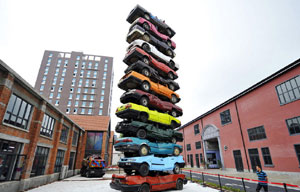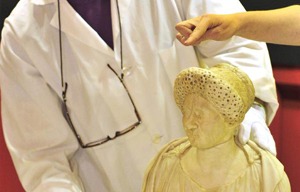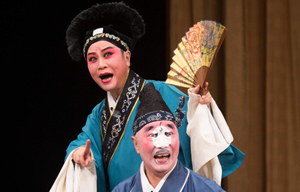
 |
|
Shanghai's Nanjing Road in the 1930s. [Photo/China Daily] |
Hotel Profile|Shanghai
Shangri-La's new flagship hotel channels an intriguing side of Shanghai's heritage, Matthew Fulco reports.
Shanghai's Nanjing Road has a colorful history that belies the banal shopping centers and office towers that line it today. The Iraqi-Jewish businessman Silas Aaron Hardoon, one of the most influential foreigners in early 20th-century Shanghai and among the richest men in Asia at the time, made a considerable part of his fortune investing in real estate along the street known as "the Fifth Avenue of Shanghai."
Hardoon, who also dabbled in the opium trade, lived with his Eurasian wife Luo Jialing on a sprawling estate called Aili Garden - then the largest compound of its kind in the city - on the corner of Nanjing and Tongren (formerly Hardoon) Roads.
There, the eccentric property tycoon funded a school for Buddhist monks and offered shelter to former Qing officials after the dynasty fell in 1911. Hardoon and his wife even enjoyed perks of the imperial lifestyle, hosting parties for concubines and employing eunuchs in their home.
When Hardoon passed away in 1931, he was worth $150 million, according to a Fortune Magazine biography published in 1935, which is nearly $2.3 billion in today's money.
Where a swath of Hardoon's property empire once stretched now stands the new Jing An Kerry Centre, a mammoth 450,000 square-meter mixed-use development highlighted by the towering Jing An Shangri-La West Shanghai, which will open on June 29.
The 508-room flagship hotel, Shangri-La's first west of the Huangpu River, joins the Shangri-La Pudong and Kerry Pudong to form a triumvirate of properties in plum Shanghai locations for the Hong Kong-based group.
Kerry Properties, which is listed on the Hong Kong Stock Exchange, has been the driving force behind the project, as it began purchasing the land on which the new Kerry Centre stands about 15 years ago.
Both Kerry Properties and Shangri-La Asia belong to the Kuok Group, a large conglomerate established by the Malaysian-Chinese businessman Robert Kuok that operates across a number of Asian countries. The group's portfolio includes commodity trading, beverages, logistics, newspaper publishing, shipping, cooking-oil refining and plantations in addition to real estate.
"This project was a lengthy process, since the land that was once Hardoon's subsequently had a lot of different owners," says Ed Brea, general manager of the Jing An Shangri-La West Shanghai hotel. "Now, all the land has one owner again."
One of the most appealing aspects of the property is its 3,000-sq-m piazza, which includes many gardens and winding pathways, Brea says. "This kind of space is rare in the city center and we expect it will become a popular rendez-vous point," he says.



